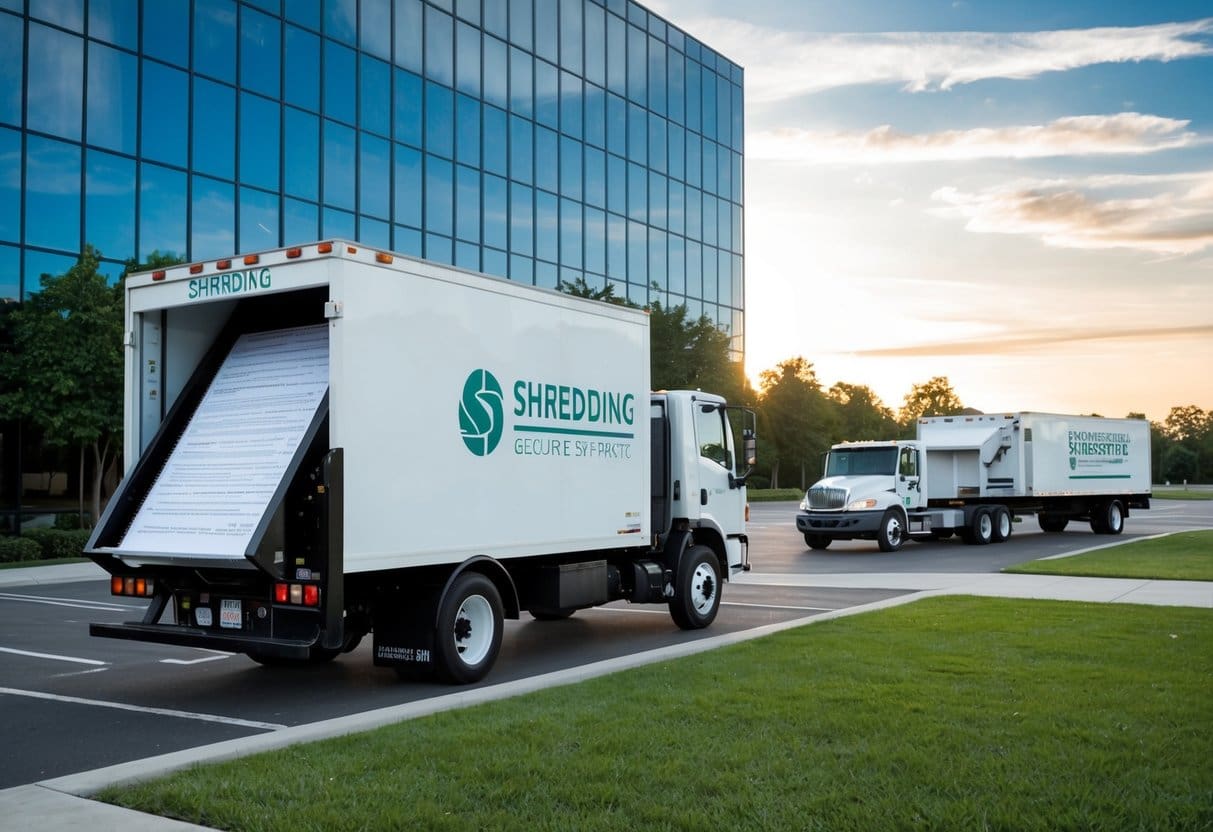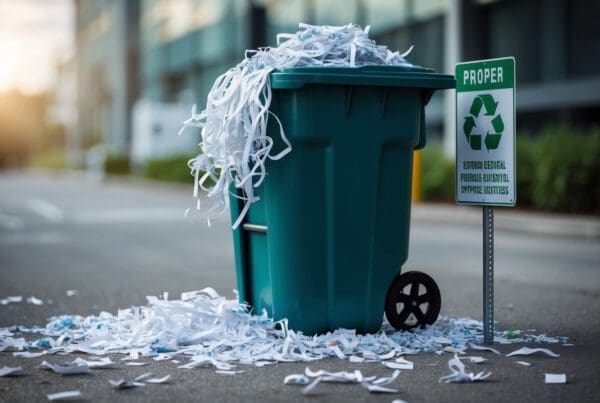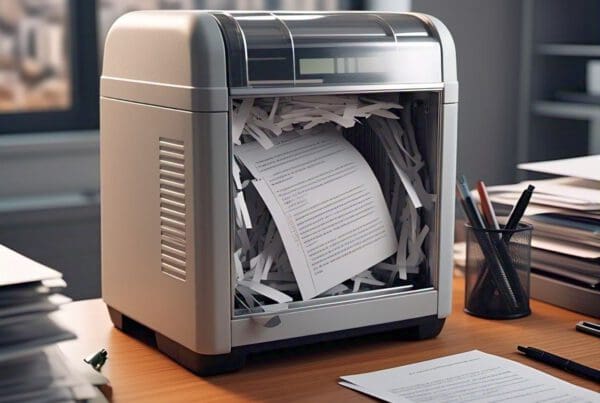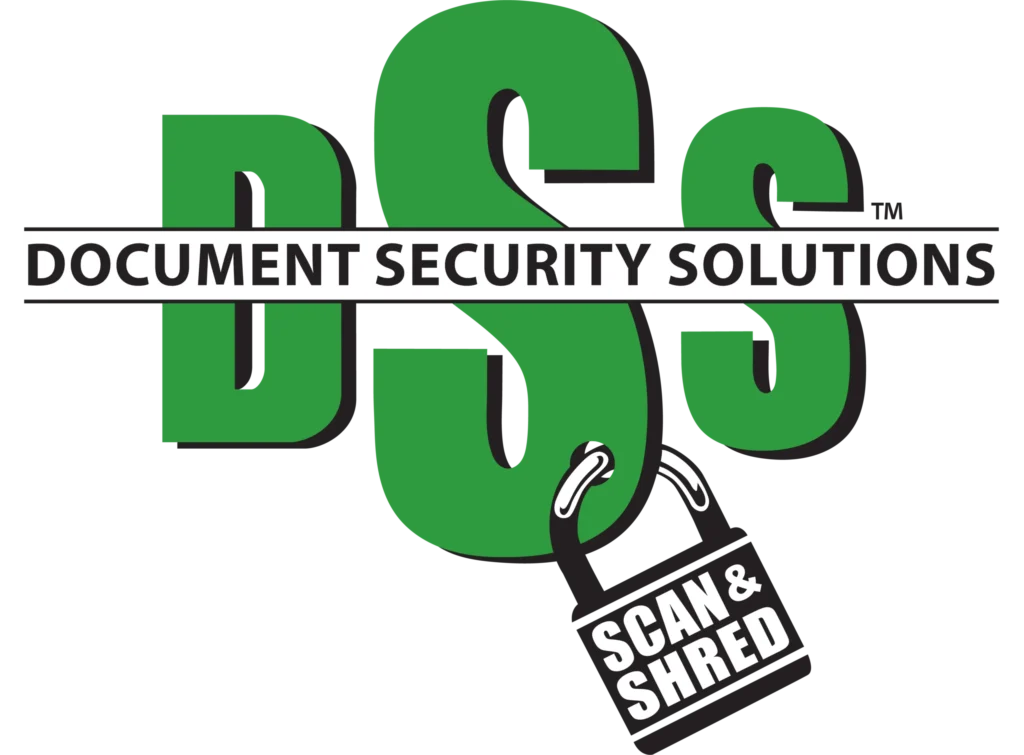Fundamentals of Document Shredding Services
Document shredding is crucial to protecting confidential information. We explore the methods used by shredding services in Georgia. Each method has its unique features, benefits, and challenges.
Understanding On-Site Shredding
On-site shredding offers a secure way to destroy sensitive documents. A shredding truck visits our location, performing the process right in front of us. This approach ensures immediate destruction and allows us to witness the shredding firsthand.
Security is a key benefit since confidential information never leaves our premises. Additionally, it provides convenience, as we don’t need to transport documents anywhere. This method suits businesses prioritizing control over information handling.
Cost might be higher compared to off-site shredding. However, some find the added peace of mind valuable. It’s also an eco-friendly option, as shredded paper is often recycled on the spot.
Off-Site Shredding Explained
With off-site shredding, documents are collected and taken to a facility for destruction. Our materials are stored securely during transport, ensuring safety. At the facility, industrial-grade shredders handle large volumes quickly. This method offers cost efficiency. It’s particularly useful for bulk shredding needs. Providers usually offer a certificate of destruction, verifying completion.
Though we don’t see the process, trust is placed in professional shredding services. For those not needing immediate shredding, it saves time and effort. There are logistics involved in tracking and ensuring the security of documents, but reliable companies minimize risks. It’s also a space-saving solution for those with limited room for shredding equipment.
Mobile Shredding: A Hybrid Approach
Mobile shredding combines aspects of both on-site and off-site services. A truck arrives with shredding equipment, and documents are shredded there, on-board. This hybrid option balances flexibility and security.
We enjoy the security of on-site shredding and the convenience of off-site services. Mobile shredding can be scheduled when we need it, offering adaptability for different business sizes. It also maintains a high level of confidentiality, with immediate destruction.
Some mobile units can handle substantial quantities of documents, making them ideal for frequent destruction needs. Cost varies based on volume and frequency, but it can be competitive with other methods. This choice suits those who want efficient, secure service without the need for large in-house shredding machines.
Legal and Compliance Aspects in Shredding
Adhering to legal and compliance requirements is crucial in document shredding. Different regulations like HIPAA, FACTA, GLBA, and others ensure confidentiality and security throughout the shredding process. Compliance helps prevent data breaches and provides proof of proper handling through certificates of destruction.
Navigating HIPAA Requirements
In the healthcare industry, HIPAA is key to maintaining patient confidentiality. We are responsible for ensuring that all personal health information (PHI) is securely destroyed. The process involves maintaining a chain of custody to track documents from collection to destruction.
Professional shredding services provide certificates of destruction. These certificates confirm that shredding complies with HIPAA standards. Knowing how important patient data protection is, we partner with firms that understand these obligations. It’s essential for us to ensure that any breach is avoided by following HIPAA guidelines diligently.
FACTA and the Privacy Act of 1974
When dealing with financial documents, FACTA and the Privacy Act of 1974 are critical. These regulations require businesses to properly dispose of consumer information to prevent identity theft. Our focus is on professional shredding practices that comply with these laws.
By using certified shredding services, we ensure legal compliance. A certificate of destruction guarantees that all materials were shredded according to FACTA. The Privacy Act of 1974 further emphasizes the importance of safeguarding personal data, demanding robust disposal methods to protect individuals’ privacy rights.
GLBA and GSA: Adhering to Financial and Government Regulations
GLBA governs the protection of consumers’ financial data. Organizations must follow specific procedures to ensure the confidentiality of sensitive information. We enforce policies that comply with GLBA to safeguard financial data during shredding.
For government documents, GSA rules apply. These standards require secure shredding and proper documentation throughout the process. Using professional shredding services ensures compliance. We obtain certificates of destruction as proof of adherence to these regulations, demonstrating our commitment to data security. Employing these best practices supports both financial and government sectors in meeting strict legal requirements, enhancing data protection.
Choosing Shredding Services in Georgia

Selecting shredding services in Georgia involves understanding different methods to ensure our confidential information remains secure. Considering local providers and their reputations helps in making an informed choice, keeping in mind the laws and requirements that we need to fulfill.
Determining the Best Service for Confidential Information
When we are managing sensitive information, such as what is covered under the Fair and Accurate Credit Transaction Act, choosing the right shredding service is crucial.
On-site shredding involves mobile shredders coming directly to us. This option provides quick, efficient disposal of our documents without them leaving the premises, giving us peace of mind.
In contrast, off-site shredding is where our papers are securely transported to a central facility. This is often more cost-effective and suits large volumes of paper shredding needs. Deciding between these services depends on our comfort level with offsite handling and the volume of shredding required.





